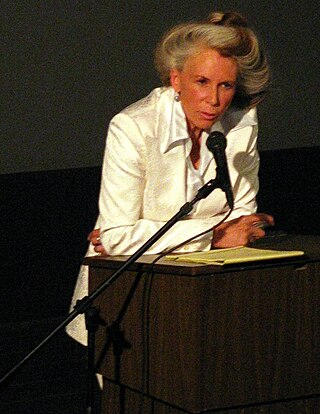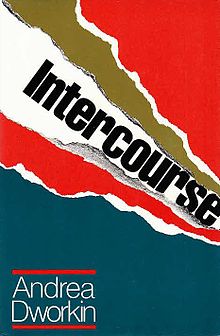Radical feminism is a perspective within feminism that calls for a radical re-ordering of society in which male supremacy is eliminated in all social and economic contexts, while recognizing that women's experiences are also affected by other social divisions such as in race, class, and sexual orientation. The ideology and movement emerged in the 1960s.
Sex-positive feminism, also known as pro-sex feminism, sex-radical feminism, or sexually liberal feminism, is a feminist movement centering on the idea that sexual freedom is an essential component of women's freedom. They oppose legal or social efforts to control sexual activities between consenting adults, whether they are initiated by the government, other feminists, opponents of feminism, or any other institution. They embrace sexual minority groups, endorsing the value of coalition-building with marginalized groups. Sex-positive feminism is connected with the sex-positive movement. Sex-positive feminism brings together anti-censorship activists, LGBT activists, feminist scholars, producers of pornography and erotica, among others. Sex-positive feminists generally agree that prostitutes themselves should not be criminalized.

Catharine Alice MacKinnon is an American feminist legal scholar, activist, and author. She is the Elizabeth A. Long Professor of Law at the University of Michigan Law School, where she has been tenured since 1990, and the James Barr Ames Visiting Professor of Law at Harvard Law School. From 2008 to 2012, she was the special gender adviser to the Prosecutor of the International Criminal Court.

Avedon Carol is an American-born British feminist, anti-censorship, and civil liberties campaigner and a researcher in the field of sex crime, residing in England. She is a member of Feminists Against Censorship, and as part of their publishing group co-edited Bad Girls & Dirty Pictures (1993). She is the author of Nudes, Prudes and Attitudes (1994), and has also worked on other books by Feminists Against Censorship. On her own website, "Avedon's Sideshow", she publishes and compiles links to a wide array of stories and events.

R v Butler, [1992] 1 S.C.R. 452 is a leading Supreme Court of Canada decision on pornography and state censorship. In this case, the Court had to balance the right to freedom of expression under section 2 of the Canadian Charter of Rights and Freedoms with women's rights. The outcome has been described as a victory for anti-pornography feminism and the Women's Legal Education and Action Fund, but a loss for alternative sexualities.

Intercourse is the fifth nonfiction book by American radical feminist writer and activist Andrea Dworkin. It was first published in 1987 by Free Press. In Intercourse, Dworkin presents a radical feminist analysis of sexual intercourse in literature and society.
The Antipornography Civil Rights Ordinance is a name for several proposed local ordinances in the United States and that was closely associated with the anti-pornography radical feminists Andrea Dworkin and Catharine A. MacKinnon. It proposed to treat pornography as a violation of women's civil rights and to allow women harmed by pornography to seek damages through lawsuits in civil courts. The approach was distinguished from traditional obscenity law, which attempts to suppress pornography through the use of prior restraint and criminal penalties.
Rites was a Canadian magazine, published for gay, lesbian, bisexual, and transgender communities in Canada from 1984 to 1992.
The feminist sex wars, also known as the lesbian sex wars, sex wars or porn wars, are terms used to refer to collective debates amongst feminists regarding a number of issues broadly relating to sexuality and sexual activity. Differences of opinion on matters of sexuality deeply polarized the feminist movement, particularly leading feminist thinkers, in the late 1970s and early 1980s and continue to influence debate amongst feminists to this day.

American Booksellers Ass'n, Inc. v. Hudnut, 771 F.2d 323, aff'd mem., 475 U.S. 1001 (1986), was a 1985 court case that successfully challenged the constitutionality of the Antipornography Civil Rights Ordinance, as enacted in Indianapolis, Indiana the previous year.

Andrea Rita Dworkin was an American radical feminist writer and activist best known for her analysis of pornography. Her feminist writings, beginning in 1974, span 30 years. They are found in a dozen solo works: nine books of non-fiction, two novels, and a collection of short stories. Another three volumes were co-written or co-edited with US constitutional law professor and feminist activist, Catharine A. MacKinnon.
Feminist views on pornography range from total condemnation of the medium as an inherent form of violence against women to an embracing of some forms as a medium of feminist expression. This debate reflects larger concerns surrounding feminist views on sexuality, and is closely related to those on prostitution, BDSM, and other issues. Pornography has been one of the most divisive issues in feminism, particularly in Anglophone (English-speaking) countries. This division was exemplified in the feminist sex wars of the 1980s, which pitted anti-pornography activists against pro-pornography ones.
An anti-pornography movement in the United States has existed since before the 1969 Supreme Court decision of Stanley v. Georgia, which held that people could view whatever they wished in the privacy of their own homes, by establishing an implied "right to privacy" in U.S. law. This led President Lyndon B. Johnson, with the backing of Congress, to appoint a commission to study pornography. The anti-pornography movement seeks to maintain or restore restrictions and to increase or create restrictions on the production, sale or distribution of pornography.
Feminists Fighting Pornography was a political activist organization against pornography. It advocated for United States Federal legislation to allow lawsuits against the porn industry by women whose attackers were inspired by pornography. FFP was based in New York, N.Y., was founded in 1983 or 1984, and dissolved in 1997.
Feminism has affected culture in many ways, and has famously been theorized in relation to culture by Angela McRobbie, Laura Mulvey and others. Timothy Laurie and Jessica Kean have argued that "one of [feminism's] most important innovations has been to seriously examine the ways women receive popular culture, given that so much pop culture is made by and for men." This is reflected in a variety of forms, including literature, music, film and other screen cultures.

Only Words is a 1993 book by Catharine MacKinnon. In this work of feminist legal theory, MacKinnon contends that the U.S. legal system has used a First Amendment basis to protect intimidation, subordination, terrorism, and discrimination as enacted through pornography, violating the equal protection guarantee of the Fourteenth Amendment.

Feminism Unmodified: Discourses on Life and Law is a 1987 book by feminist legal scholar Catharine A. MacKinnon. The book is a collection of essays by MacKinnon delivered during the 1980s, in which she makes a radical feminist critique of pornography and liberal feminism.
Feminist views on sexuality widely vary. Many feminists, particularly radical feminists, are highly critical of what they see as sexual objectification and sexual exploitation in the media and society. Radical feminists are often opposed to the sex industry, including opposition to prostitution and pornography. Other feminists define themselves as sex-positive feminists and believe that a wide variety of expressions of female sexuality can be empowering to women when they are freely chosen. Some feminists support efforts to reform the sex industry to become less sexist, such as the feminist pornography movement.







